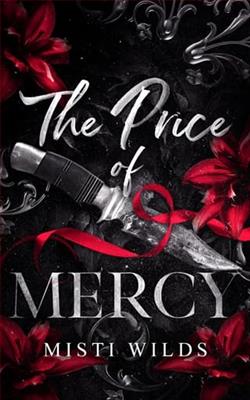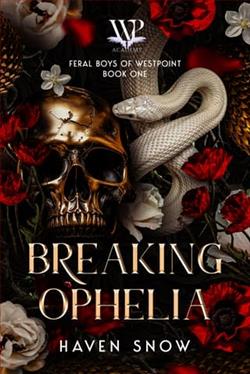Page 107 of Mrs. Endicott's Splendid Adventure
Ellie stared at him. “As if that matters,” she said. “What good is money any more when you lose the people you love?”
“That’s true,” he said. “But I wanted you to know that you don’t have to worry about paying for the villa. It’s yours now.”
Life went on. The summer arrived with blistering heat that fried the most delicate plants. The goats survived on the hillside, in the shade of big pines. The villa remained delightfully cool with all the windows open for the breeze off the water. Ellie went down to the village most days. There was usually a small loaf of bread to be had, and the fishermen brought in their catch. The Germans oversaw the harbour and took the best of everything, but the local inhabitants were allowed to buy the rest. Ellie and Clive took to going down to the dock and fishing for themselves. They found shrimp and mussels in the rock pools and occasionally something bigger. The two cats, as if sensing that life had become harder and that meat no longer appeared on the table, took to catching things, depositing a mouse or a bird on the doorsteps in the mornings. Ellie found it touching, and didn’t have the heart to tell them to stop.
The war news was encouraging. The Allies had landed in the south of Italy and were making progress northward. Then, in September 1943, the Italians surrendered. Germany poured soldiers into Italy to occupy it and stop the Allies’ advance. There were bloody battles, but it seemed that small gains were being made on all fronts. Finally Germany was losing. News trickled in about death camps in the east of Europe, also about death and destruction nearer to home. The Nazi forceshad rounded up hundreds of citizens of Marseille, mostly Jewish, and had destroyed the old town. Ellie and Clive worried constantly about Tommy. They had heard nothing and had no way of asking.
Just when Ellie was hopeful, the Allied advances seemed to have stalled. It was taking so long to inch forwards through Italy, as the Germans had dug in with lines of great bunkers. Whatever was happening, it made little difference to Saint-Benet. Everyone shared what little food they had. Those with smallholdings brought in extra crops and traded for fish. Clive’s goat cheese and honey were traded for grapes and beans. This way, they kept going into the spring of 1944.
On June 6, the Allies landed on the Normandy beaches. Although news was hard to come by, it seemed as if the beginning of the end had come. A beautiful summer followed, with abundant crops, as if the earth itself were trying to make up for the suffering they were enduring.
And on August 15, the biggest feast day in the French calendar—the Feast of the Assumption of Mary—the American Seventh Army landed along the south coast of France. The German soldiers were pulled away from Saint-Benet, and everyone held their breath, waiting for good news. A week later the Free French army, with the help of the Americans, landed in Marseille. A fierce battle ensued that lasted several days. From Saint-Benet they could see smoke and hear distant explosions. But after three days of fighting, the Germans withdrew. Marseille was free. There was a great celebration in Saint-Benet as French troops came into the village. People brought out hidden bottles of wine, and there was music and dancing. Ellie, Clive and Madame Barbou sat off to one side, watching the joy but unable to join in and share it.
Will I ever be happy again?she asked herself.Will I ever laugh? Have hope?It still seemed impossible. But at least her neighbours were feeling their freedom. At least they could bring down the goats, who had survived remarkably well.
It was September 29, the feast day of Saint Michael, reminding Ellie of that first celebration when they arrived in France. How different and foreign it had seemed, the women in their local dress and the dancing and laughing, the obvious enjoyment of life. So not British. All the things she now took for granted. She was sitting on the harbour wall, watching the revelry, when she looked up, froze. A naval vessel was approaching. Silence fell as everyone saw it coming. Then there was a collective sigh of relief when the American flag was spotted on it. It tied up at the harbour, and several American sailors stepped ashore.
“We’ve come at the right time, Joe,” one called to the other. “There’s a party going on. Come on. Let’s join in.”
More sailors followed. They were greeted warmly, hugged by the women, slapped on the back by the men and offered glasses of wine. Ellie had turned away from the boat to watch, but it was hard to take such revelry, so she stared back, out to sea. A lone man had left the boat and was coming towards her along the harbour. He walked with a slight limp, and his unruly hair was grey. She stared. Blinked. Stared again. Then she climbed over the harbour wall, not minding who saw her petticoat or her thighs, and she began to run. He spotted her and started to run, too. They fell into each other’s arms.
“I don’t believe it,” she gasped. “Is it really you? Am I imagining it? Are you real?”
“Does this feel real?” he asked, and he kissed her.
They remained locked together, not noticing the other people who swarmed up to them. “It’s Nico. Nico come back from the grave.” The words echoed around the harbour.
“They said you were dead,” she said, blinking back tears, when they finally broke apart. “That German officer said they shot you and the abbot in the water after they sank your boat.”
“They did,” he said. “A German gunboat fired a shell at the boat and blew up the petrol tank, hurling us both into the water. Then they circled back and shot both of us.” He gave that cheeky, long-remembered grin. “A bullet went into my shoulder. Another into theabbot’s chest. I decided to play dead. I floated face down until they had gone away. Then I went to see if there was anything I could do to save the abbot.” He paused. Ellie steeled herself for bad news. “I located him nearby. He was still alive, but he was in a bad way, bleeding a lot. We were probably a couple of miles from the coast of Corsica. I could see it in the distance. So I started to swim with him. I didn’t give us much chance, as I couldn’t use one arm. I was bleeding, I wasn’t sure exactly from where, but he was bleeding badly. But I kept going, and I suppose it was having the abbot with me, divine providence, you know, but at nightfall a fishing boat came out from Calvi and spotted us. Picked us up. Took us to a little village down the coast where they said we’d be safe from the Italian troops. There were members of the Resistance nearby, and they got the abbot up to a hospital. They patched me up, too. Turns out the bullet had gone clean through my shoulder, missed my heart by a centimetre. I’d also damaged my leg when they blew up our boat and I was thrown clear.” Ellie squeezed his hand. He smiled at her. “God knows how I even managed to swim. Again it must have been the abbot, calling down divine assistance. We were hours in the water, both bleeding, but no sharks came near us.”
He stopped, looking around at the crowd that had now gathered and spotting his mother.
“Maman.” He ran to her with open arms and hugged her fiercely.
“My son! We thought we’d lost you,” she sobbed.
“I tried to send a message,” he said. “But the German navy patrolled this area so well it was impossible to get a boat through. The local Resistance tried sending radio messages to Marseille, but they must have broken up that cell and we got no answer. So I just had to wait it out and recover. It did take me several months.”
“What of the abbot?” Ellie asked. “Did he survive? Do you know?”
“He did. They removed the bullet, and he was sent to a monastery up in the mountains to recover. He’s still there until he can contact his motherhouse and come home.”
“It’s a double miracle,” Nico’s mother said. “Praise God. We must make a big donation to Saint Jude, because you were surely a lost cause.”
“So go on with your story,” someone called from the crowd.
Nico nodded. “And then the Italians surrendered, and all was good. They were hugging us and sharing their wine with us. I don’t think any of them had wanted to fight in the first place. Then at last the Americans came, and here I am.”
“Here you are,” Ellie said.
“Come and join the feast, Nico.” One of the fishermen put an arm around his shoulder.
“Thank you, but right now I’d just like to go home,” he said.
“Your mother is living with me up at the villa,” Ellie said. “Can you make it up the steps?”
“I’ll give it a damned good try,” he said.















